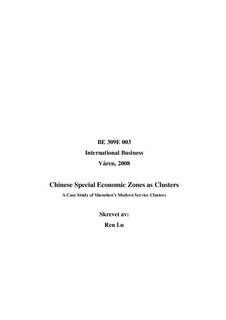Chinese special economic zones as clusters : a case study of Shenzhen's modern service clusters
Abstract
Special Economic Zones (SEZ) are limited geographic regions where the authorities offer some preferential policies for pushing local economy development. A cluster, on the other hand, is a market economy phenomenon, in which several firms locate themselves in some certain geographical areas for the purpose of reducing costs and, raising profits on the basis of external economies between the firms..
Shenzhen SEZ is a combination of a SEZ and a collection of Clusters. It was one of the earliest and the most successful Chinese SEZ during last 30 years. During this period, many clusters appeared and disappeared within the zone, from traditional service clusters to modern service clusters, from manufacturing clusters to high-tech clusters, etc. Today, Shenzhen’s four foundation clusters—logistical cluster, financial cluster, real estate cluster and high-tech cluster—have contributed more than half Shenzhen’s GDP.
This thesis examines from several points of view and with the data that can be had the question of whether the state-created SEZ of Shenzhen has exploited the kind of positive externalities that are, in a free market economy, the reasons for the existence and the persistence of clusters.
Description
Mastergradsoppgave i bedriftsøkonomi - Høgskolen i Bodø, 2008
